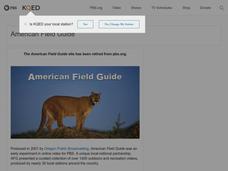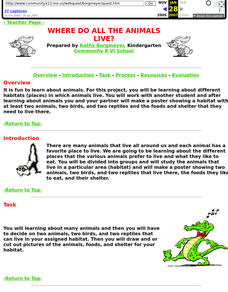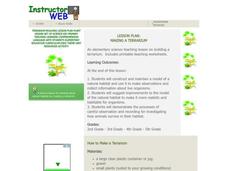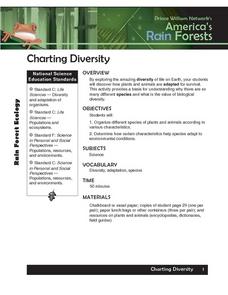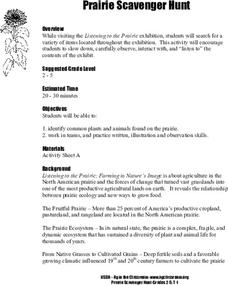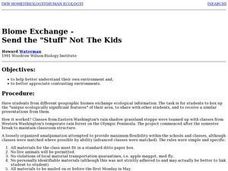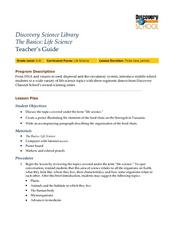Curated OER
The Formation and Value of Temperate Grasslands
Students get an overview of the climate and organisms of the North American Prairie. After a lecture, and watching some videos imbedded in this plan, students compile research data on the North American Prairie.
Curated OER
Animals Around Us
Students view and discuss a Discovery Channel video that compares the animals found in four different habitats. They compare and contrast the characteristics of forests, deserts, wetlands and grasslands then choose one to depict in a...
Curated OER
Prairie Scavenger Hunt
Middle schoolers take a close look at the prairie environment. They identify common plants and animals of the prairie. In addition, pupils work in teams in order to put together a presentation on a certain aspect of the prairie...
Curated OER
Am I Taller than an Antelope
Students investigate biology by examining body sizes of different animals. In this antelope measurement lesson, students research the physicality of Antelopes and other large animals that inhabit Earth. Students create a model Antelope...
Curated OER
Close to Home
Fourth graders examine habitats for animals by creating their own in class environment. In this environment lesson, 4th graders research the Internet for information on certain wild animals and the places in which they live....
Curated OER
Where's the Grass
Students participate in a grassland game. In this grassland lesson, students simulate the impact of grazing animals and invasive weeds on grasslands.
Curated OER
Where Do All the Animals Live?
Students study animal habitats and make a poster showing two animals, two birds, and two reptiles in their habitats.
Curated OER
Praire Biome Models
Fifth graders, in groups, list the physical characteristics of a biome and think of ways in which animals might have to adapt to live there and make a biome mobile ball that show the different types of habitats that shape the praire biome.
National Wildlife Federation
What's Your Habitat?
How are third graders like rabbits? They both live in habitats and require food, water, and shelter to survive! An educational science lesson encourages your learners to think about their own habitats and survival needs, before comparing...
Curated OER
Animals of Madagascar
Students are each assigned an animal from Madagascar. They research their animal and design a picture book about their animal. Students design a cover page, back page, bibliography page and the title page. Their book will contain...
Curated OER
Happy in My Habitat
Fourth graders create animal habitats and explain the biomes they live in. In this habitat lesson, 4th graders recognize the basic needs of animals, characteristics of animals differences and places where they live. Students...
Curated OER
Making a Terrarium
Students construct and maintain model of natural habitat, suggest improvements to the model of the natural habitat to make it more realistic and habitable, and demonstrate careful observation and recording of how animals survive in their...
Curated OER
Charting Diversity
Students organize different species of plans and animals according to various characteristics. Students then determine what characteristics enable them to survive in their habitat. Game ideas and activities are included.
Curated OER
Ecosystems Online
Students work together to gather information on ecosystems from websites. They identify plants and animals and create their own website. They are graded on their willingness to work together and the content on the website.
Curated OER
Prairie Scavenger Hunt
Students search for a variety of items while visiting a Listening to the Prarie exhibition.
Curated OER
Biomes of the World (and Canada)
Young scholars explore environments by analyzing food chains. In this biome identification lesson, students define a list of environmental vocabulary terms such as tundra, rain-forest and desert. Young scholars create a fictional self...
Curated OER
In The Zone
Third graders identify ways that ocean animals grow, survive, reproduce, and adapt. They use computer Internet skills to acces and collect information. They create a PowerPoint presentation. They demonstrate writing skills throughthe...
Curated OER
Natural Features of Our Community
Second graders read about and discuss natural features of communities. They listen to a guest speaker, such as a park ranger to expand their knowledge of natural features. They go on a field trip, if possible, to a local zoo or...
Curated OER
Biome Exchange - Send the "Stuff" Not The Kids
Students exchange ecological information with students from different geographic biomes. They box up the "unique ecologically significant features" of their area, send the box to another class in another area and then receive a similar...
Curated OER
Survival of the Fastest: Predator and Prey in the African Savannah
Students explore the predator-prey relationship using an interactive game. In this biology lesson, students compare their physical attributes. They explain how predators develop to make it stronger and efficient as hunters. Each...
Curated OER
Habitat Mural
Young scholars build a collage of an ecosystem. The goal is for them to understand interactions in a community, plant and animal adaptations, and how all life depends on plants. This activity is based on Wump World and students describe...
Curated OER
The Basics: Life Science
Students develop an understanding of the different fields of study that are encompassed by the term, life science. They view and discuss a video on the topic. In small groups they focus on on of the examples shown in the video to create...
Curated OER
Land Associations
Middle schoolers identify and explore life forms of various biomes, define transitional regions, examine effects of abiotic and biotic interactions, research a biome, and produce newspaper that features environmental information. Lessons...
Curated OER
Life As A Tree
Third graders design a plate to represent the three parts of a tree. In this tree parts lesson plan, 3rd graders learn about the functions of each part and design the plate to resemble the rings of the tree.
